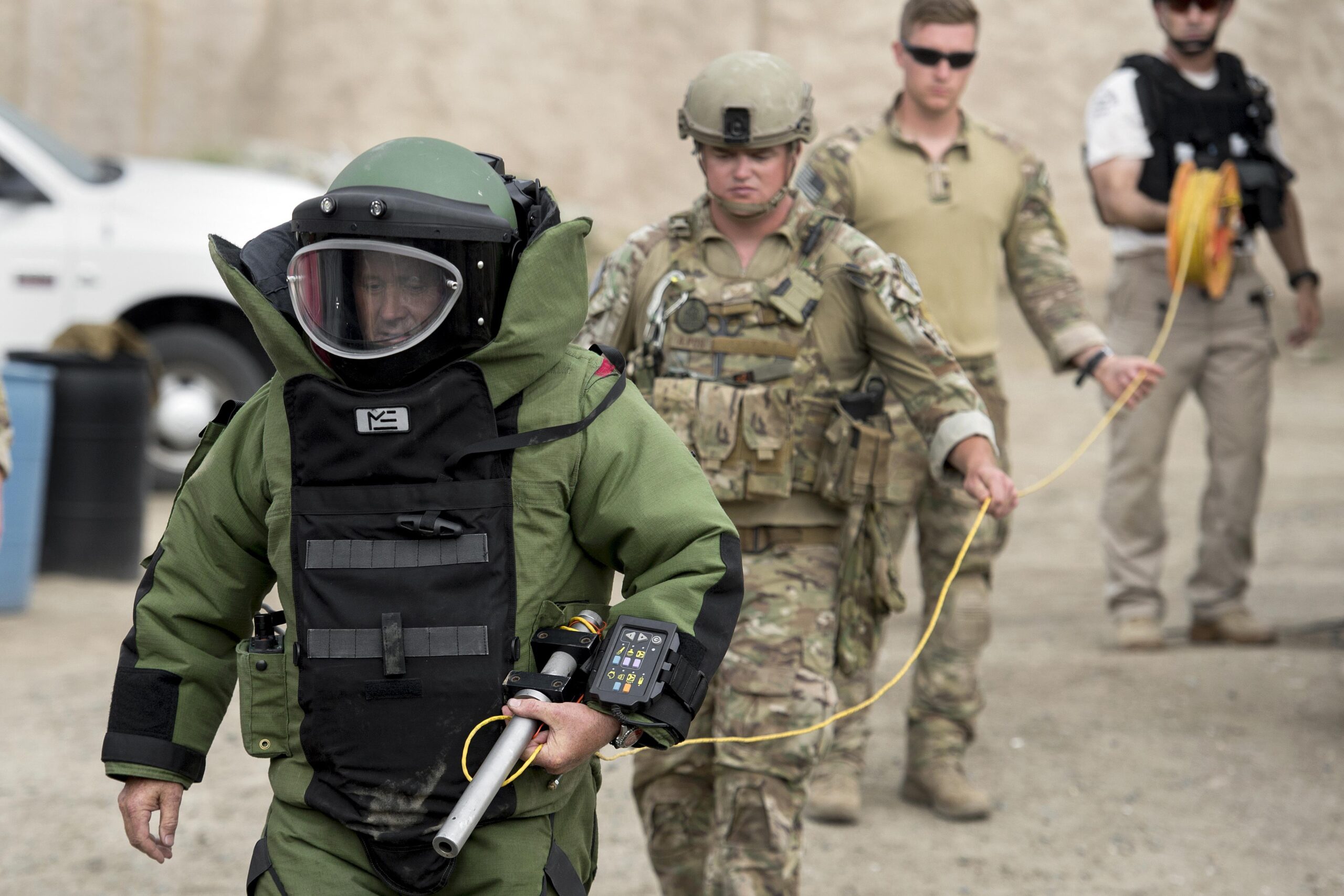One of the best parts of making The Leadership Detectives series of blogs and podcasts is learning from leaders across all sectors and industries.
Interestingly, even though we have spoken to a wide range of leaders across countless sectors, many of the core characteristics of a great leader remain the same.
One great example of this was our fascinating conversation with Chris Hunter. Chris has over 30 years of military experience, specialising in bomb disposal in war zones across the globe, from Iraq to the Falklands.
In this article, in order to pick up some more valuable lessons, we asked Chris for his view on what makes a great leader.
We started by asking Chris to sum up the key elements of leadership he has seen or learned over the last 30 years:
Chris: “There are many elements that make up a great military leader:
- Effective communication.
- The continual pursuit of knowledge, learning and planning for the worst.
- Inspiring others to achieve the otherwise unachievable.
- Courage (moral and physical courage).
- Emotional intelligence.”
Effective communication in war and business
Chris: “A good example of communication from everyday life is travel. If you are going off on holiday and your train or plane is delayed, nobody likes it, but they are prepared to tolerate it.
However, things start to break down, and people start getting annoyed, when these delays are not explained.
As leaders, we can get really tied up in the moment, but sometimes you’ve just got to pause, reflect, and communicate where you are with your team.
Even by trickle feeding that information, that’s often enough to make people feel valued and stop any breakdown from happening.”
Communicating downwards
One of the things they do very well in the military is pass information down the chain of command, but in business, it’s much easier to forget to do this.
A business leader can go off to a board meeting, gather all of this information, and get on with their day without communicating it downwards.
We asked Chris what he thought the difference was with leaders who communicate in business as opposed to the military:
Chris: “In the military, one of the great components of military success is knowing exactly what your boss and your boss’s boss are trying to achieve.
That means if a plan goes belly up, at least you know what the intent of his plan is, and you can do something useful to influence that for the greater good.”
This is a very useful tip for any leader. Regardless of sector, communicating your plan and vision properly so your team knows what you are trying to do, is crucial to overall success.
The continual pursuit of knowledge, learning and planning for the worst
Chris: “Another important element of military leadership is constantly learning and planning ahead of time.
A great example of this is the Iranian embassy siege in 1980. Those soldiers were well trained way before the siege took place. They built a scaled replica of some of the rooms, and they practised, trained and repeatedly rehearsed until they knew every single detail of the plan.”
This idea of constant rehearsal is a fundamental element to the success of military operations, but businesses don’t always have the opportunity to train somebody up for 6–12 months before a task.
Now, it can be argued that there is not as much at stake in business, so this training isn’t needed, but business leaders need to make more space for rehearsal or practising and role-playing with their teams. It doesn’t have to be to the extent of SAS forces preparing for an embassy siege, but when you don’t take the time for rehearsal and practice, that’s when costly mistakes are made.
Inspiring others to achieve the otherwise unachievable
Chris: “One of the most remarkable examples of leadership I have seen was during my role in the 7/7 London bombings.
I was across the road from Downing Street in the old war office building, brought in as the lead for worldwide improvised explosive device intelligence.
Our leader was Colonel Kemp, who I had worked with before, and when the room suddenly grew from an office of 5 to one of 50, many of whom were ministers, he was able to create a calm environment and got the best out of everybody in the room.
This was a chaotic time when nobody knew each other or what was happening outside. All our loved ones were in London, or somewhere where we worried about them, but Kemp gave everybody a chance to contribute and brought everyone together in the most brilliant way.
I think military leadership is all about inspiring others to achieve the otherwise unachievable in any given situation. That doesn’t mean they wouldn’t achieve something otherwise, but I think a military leader inspires them to achieve the optimum results regardless of how smart or capable they are.”
This is very true for leaders in the world of business too. You’re just not putting lives on the line in quite the same way!
Courage (moral and physical courage)
One thing that has become obvious from speaking with Chris is that a great military leader is someone who can keep their head and stay courageous even when they are put under enormous pressure.
Knowing how useful this can be in business, we asked Chris for some advice for leaders on the best way to lead and keep your courage going, especially when you’re under pressure:
Chris: “When we talk about fear, it almost always comes down to two things:
- Fear of danger.
- Fear of failure and ridicule.
The fear of danger is very much something tangible and can be paralysing. (Check out our podcast episode for Chris’s incredible story on this.)
The other type of fear I see a lot is the fear of failure and ridicule, which is a shame because it’s absolutely unnecessary.
Fortunately, you can plan and stay courageous even when experiencing either of these fears. Courage isn’t about the lack of fear; it’s about understanding that you are afraid and carrying on with whatever it is that terrifies you.
This is where planning and rehearsing can really help you. We always used to say, if Plan A fails, remember, there are another 25 letters in the alphabet, so always have a Plan B ready.
Also, whenever you are facing fear as a leader, try to break it down. Ask yourself if anyone really has the time to be bothered about how I feel.
Most people in a business environment are way too busy focusing on their own areas of responsibility to be concerned about judging or ridiculing what you are doing. You’ve got to rationalise that fear. You’ve got to break it down and try to compartmentalise it before you start to deal with it.”
Emotional intelligence
When we talk about emotional intelligence, what we really mean is being more human as a leader. We have spoken a lot about it in previous blogs, but we were curious to see what that means in the context of military leadership. Here’s what Chris had to say:
Chris: “I’ve been unlucky enough and lucky enough, in equal measure, to see the best and the worst of human nature. However, people are fundamentally good in my experience, so I don’t think you can be a leader in any sense if you don’t possess humility, compassion and understanding.
If you were morally defunct of those qualities, I don’t think you’d last for very long!”
We hope you found this article useful!
We are always keen to chat with anyone about how they can improve their leadership skills, so to get in touch, feel free to reach out to us on neil@xnrg.co.uk or albert.joseph@excelleration.co.uk.
Alternatively, you can find out more about how The Leadership Detectives could help you by booking a free coaching session with us via our website.






